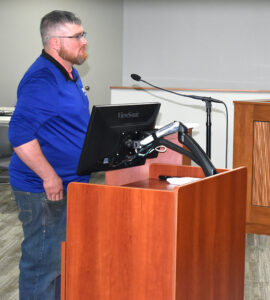MFL leaders ask council for help on water bill
After they previously tabled the discussion item to allow time for a legal review, members of the Marshalltown city council once again considered a request from leaders of the Marshalltown Football League (MFL) to revisit the lease agreement between the two entities and, more specifically, the decision to bill the league for water usage at the fields on South 6th Street.
City Administrator Carol Webb explained that last July, the Marshalltown Water Works (MWW) Board of Trustees began to bill the city for those expenses, and the council signed an agreement passing those fees on to MFL, whose leaders questioned them and did not feel they should have to pay them.
“This item is to really ask the council ‘Are you satisfied with the lease agreement as it’s been written?’ and ‘In particular, are you OK passing on the charges to MFL for water usage?'” Webb asked.
Councilor Jeff Schneider started by saying he wished the MWW board would revisit its decision but felt the city ultimately had no choice but to pass on the cost, and Councilor Melisa Fonseca asked Webb how long the MFL had leased the property for $1 annually — she wasn’t exactly sure but believed it had been a long time.
Fellow Councilor Mike Ladehoff asked if other organizations leasing the space at the 6th Street complex paid their own water fees, and Webb said that both the Marshalltown Softball Association and the Little League paid their own water usage fees. Schneider suggested creating a master plan for sports complexes within the city, and Councilor Barry Kell, who currently coaches two sports, wasn’t sure whether the leases were being considered based on city-owned property or impact and usage by the community.
“I think we just need to have a more thorough discussion vs. whack-a-mole, which we’re doing right now, and again, ultimately, I think this is, again, a bad decision from the Water Works board that we’re here having to address, but I think we need to have a more principled approach on how we’re determining the impact,” Kell said.
Councilor Gary Thompson said the city’s current leases are “completely out of whack” and felt the playing field needed to be leveled, but he worried about a slippery slope and the city being expected to cover every organization’s water bill going forward.
“Until we know what the future’s bringing, we’ve gotta start somewhere,” he said. “So maybe we do a short term lease for one year to buy us some more time. I don’t agree with what the Water Works did, but I don’t think this is our doing. This is our reaction to it to level the playing field, and I personally don’t see a way out of this to not require the MFL to pay for the water usage.”
He did, however, cite the positive economic impact of the MFL and noted that he and his kids had gone through youth sports. Monte Eaton of the MFL Board came forward and told the council the organization had been established in 1972 with a $1 a year lease and the city paying for the water.
“I’m not sure why the water department decided to start billing when they did, but they did. And the city council can give the water department board direction on which way they think it should go,” Eaton said.
He added that the lease contains outdated terminology and highlighted the tourism impact the MFL has with between 8,000 and 10,000 visitors over the six-week season – the vast majority coming from outside of Marshalltown. Eaton requested that if the league is billed for water, they should receive $50,000 per year from tourism dollars for the next three years to help offset the cost.
Webb then commented that the criteria applied by the Water Works board about who will be charged for water are “a little random” before breaking down the details further. In response to a question from Fonseca, Eaton said his best cost estimate for the annual water bill is around $2,000, and she also wondered how the water was used — he said it was primarily sanitation, restrooms, and watering the fields during the season. She inquired about whether the bill would create a financial burden for the MFL, to which Eaton replied “definitely.”
“Youth sports, all sports, all youth organizations are feeling the hit, economics. The field maintenance, insurance is up, contract labor is up, equipment’s up. Unlike soccer and softball, we supply all the equipment… The only thing we don’t supply is cleats and socks and undergarments,” he said.
The fees for the six-week tackle football season are $125 per player running from first grade all the way up to middle school, and Eaton said the revenues collected are reinvested in equipment, which results in a net-zero financial picture at the end of the year. Councilor Mark Mitchell inquired about metering the water on the field separately from the restrooms, and Eaton said it would only do away with the stormwater and sewer fees, which the city has already agreed to waive.
MFL President Walter Anderson came forward and noted that the league has already been operating in the red for the last three years with the costs of insurance, equipment and other expenses rising. They’ve been forced to raise registration costs as a result, and he said that has resulted in less kids going out if families can’t afford it.
“To me, sports is keeping kids entertained, moving forward (and) keeping them off the streets doing dumb stuff,” he said. “It’s keeping them moving forward so they can learn teamwork, responsibility, and it’s also proved that student-athletes are better in school and move on to better careers. So as a community, we need help. That’s all we’re asking for.”
Jim Shaw asked about who is in charge of the Water Works and joked about “pulling a Trump” and firing people if their actions are not aligning with the council’s wishes. Webb said the decisions are made by the Water Works Board of Trustees, which is appointed by council and subsequently oversees the management of the independent entity. Dave Grieve noted that in the budget, the city did pay for a new Water Works truck and wondered if they were being expected to pay for that.
“I’ve asked for an (organizational) chart. Maybe we can get an org chart so citizens can know where all these rules are, who I go talk to because I can’t make heads or tails of 14,000 ordinances. I can’t make heads or tails of all the codes that I have to deal with, and I don’t even know where to turn, so who runs the water department?” he asked.
He also raised concerns about chemicals in the water and said he distills his own. Councilor Mike Ladehoff attempted to clarify that the water department has been its own entity for over 50 years with its own board.
“That’s the way it works. I don’t know why. As far as ‘Oh, go fire them,’ we can’t. They’re not even under us, Jim,” he said.
When an issue previously came up regarding water at Riverside Cemetery, Ladehoff added that he went to the board to try and persuade them to take a different course of action, and he was rejected and didn’t have power to put pressure on them — from the back of the room, Grieve replied that the explanation “didn’t make sense.” Eaton then clarified that the city council does appoint the Water Works board members, which subsequently runs the department as it sees fit.
With Webb seeking direction, Schneider motioned to put the MFL water bill in the city’s Parks and Recreation budget, but it failed by a 5-2 tally with only Schneider and Fonseca in favor. Thompson asked Anderson about a time frame for how soon the MFL leadership would need to know about a decision and adjust its rates accordingly if the bill is passed on, and he responded that registration is already open with an increase “just in case” — but he felt it still wasn’t enough as they’re currently behind 120 helmets.
“If we have to, we’ll move forward, and we’ll most likely have to pay or we won’t have an organization,” Anderson said.
Mayor Joel Greer liked the idea of putting a master plan together, citing the success of some of the other committees the council has put together, and Thompson asked Webb about administratively extending the expired lease and visiting with the Water Works board about options for the future. A water use study, she replied, would probably take longer than six months to conduct.
Schneider then motioned to bring back a proposal for a placemaking plan for all of the sports complexes in town and reviewing available grants while “re-envisioning” the bigger picture. Thompson motioned for the city to continue to pay the bills through an administrative extension, but Webb did note that the MFL has already paid some of its own bills. Schneider clarified that his motion on the master plan was already proposed, and it passed by a unanimous tally.
The council then moved on to Thompson’s modified motion to refund MFL for bills it has already paid and continue to pay them going forward until the details are hashed out, but Kell expressed concern that Little League and the softball league would come forward with similar requests at upcoming meetings.
Thompson’s motion ultimately passed by a unanimous 7-0 tally.
——
Contact Robert Maharry at 641-753-6611 ext. 255 or
rmaharry@timesrepublican.com.
- T-R PHOTOS BY ROBERT MAHARRY — A sign just off of South 6th Street directs visitors to the Marshalltown Football League (MFL) fields. On Monday night, the city council and the league’s leadership discussed the current lease situation and a recent policy change by the Marshalltown Water Works (MWW) Board of Trustees regarding the responsibility for paying the organization’s water bills.
- MFL President Walter Anderson addresses the city council on Monday night. After a discussion that ran over a half hour, the council voted unanimously to refund the MFL for water bills it has already paid while continuing to pay them through the city budget for the time being until a new lease agreement is agreed upon.








